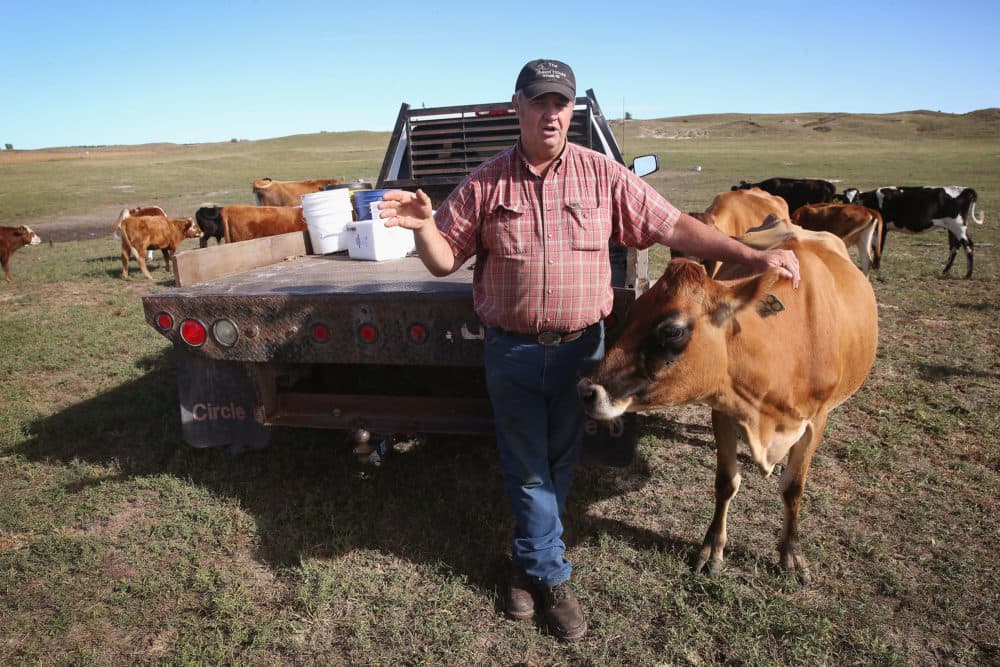Advertisement
'Pretty Devastating': Major Midwest Flooding Threatens Region's Agriculture Industry

Days of heavy rain and snow melt brought historic flooding to parts of the Midwest. The widespread flooding has killed three people and forced thousands to evacuate their homes.
The recent storm has especially affected farmers, who are dealing with massive crop damage and livestock losses.
“Agriculture is really the backbone of Nebraska. As agriculture goes, so goes the state. And it's pretty darn tough,” says Bill Thiele, the board president of the Nebraska State Dairy Association.
Officials estimate that Nebraska’s agriculture sector is losing $1 million a day from the flooding, ruined properties and road closures. This financial loss comes at a difficult time for farmers, who are also dealing with trade tariffs, rising costs and bankruptcies.
“The impact is going to be huge,” he tells Here & Now's Peter O'Dowd. “And there's no doubt there will be a number of people that won't survive this and the state financially.”
The storm’s timing couldn’t be any less ideal. In Nebraska, known as “The Beef State,” calving season is in full swing. Thiele says ranchers he’s heard from are “dealing with a lot” in their efforts to protect livestock from the flooding.
Interview Highlights
On how farmers and ranchers across the state are feeling
“This is pretty devastating. We've been dealing with the flood here for several days now. Everybody kind of knows about the water, but I think the personal stories and the losses — we're going to start to hear a lot more about that as the days unfold.”
On farmers protecting their animals
“I've talked to milk haulers [and have] been in touch, kind of, with our State Department. For the most part, we've been successfully moving milk pretty well. It's more of the infrastructure [that] is pretty tough right now. I’ve heard from the milk haulers saying [on] average, they're now driving about an extra 150 miles just to pick up or drive milk to the plants one way.
“We're not as seriously impacted here in Antelope County as a lot of states, but even here we have just heard yesterday, 65 percent of our roads have damages, [and] 56 out of the 93 counties are drastically affected.”
Advertisement
On the timing of the flood
“It's calving season for all our ranchers out here in this country. … Those that started calving a little bit earlier, they've been dealing with blizzards and snow and ice and they are already looking pretty haggard from round the clock babysitting of those mama cows. Talked to a few people here just in the last couple of days. A friend of mine calves about 1,500 cows and everybody out here tries to be pretty self-sufficient and you don't hear a lot of complaining or bickering. I know he told me personally he's already lost 40 calves in the last couple of days. It's not getting much easier.
“Although that's way more [calves] than they would expect [to lose] in that short period of time, but it's huge. … I know another rancher that says, I don't have firsthand knowledge of it, but they're constricted to rural water and the last couple of days they've got about 5,000 heads that they're trying to figure out how to get water to them or it's whether it's hauling them in or moving cattle out. So it's real out here.
On the hit farmers are taking, from the storm to the trade tariffs
“A lot of people are going to have to make decisions, even if the federal government won’t step in or some agency, usually that means the best you can hope for is [to] take out low interest loans. But with the financial pressure that people [have] been in, I think a lot of people just decide they've had enough. They'll just give up. We've got farms totally wiped out, houses and all buildings and equipment that are gone. People that still can't get in or out of their places.”
Marcelle Hutchins produced this interview and edited it for broadcast with Todd Mundt. Serena McMahon adapted it for the web.
This segment aired on March 19, 2019.
